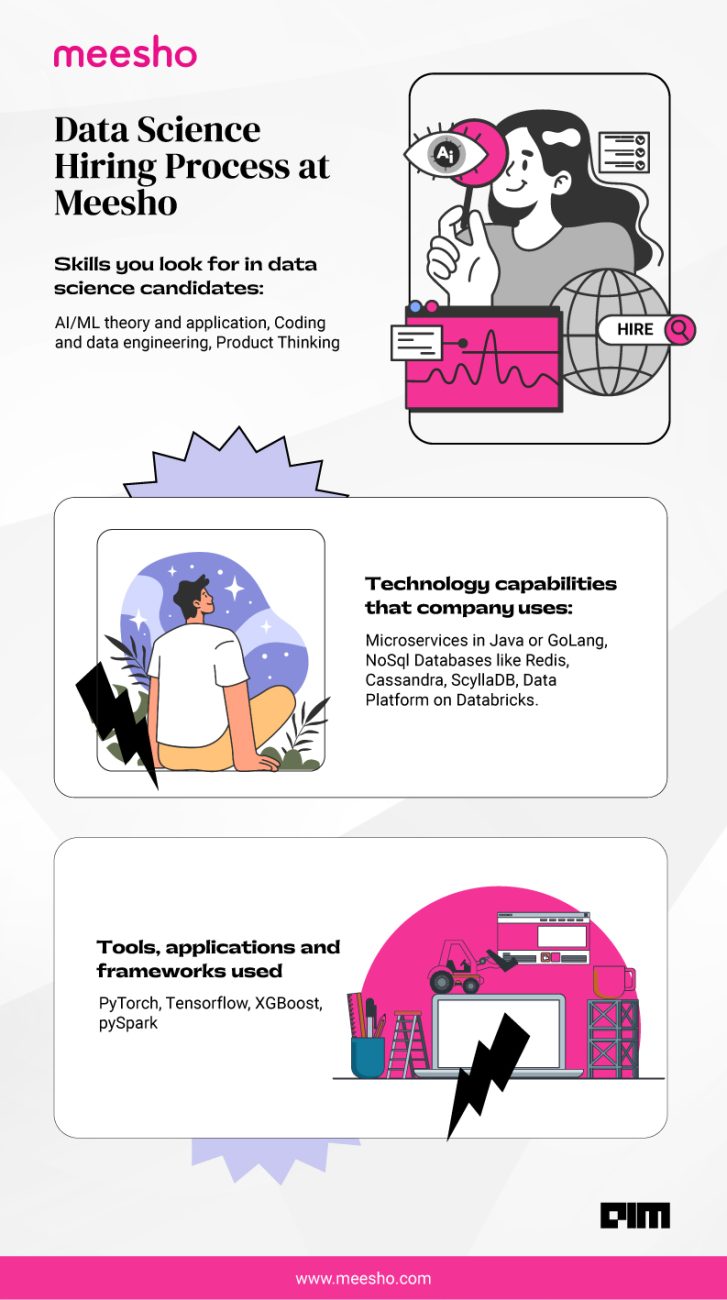Founded in 2015 by Vidit Aatrey and Sanjeev Barnwal, e-commerce platform Meesho has over 100 million customers. It recently surpassed a record 1.1-million seller mark on its platform, attracting over 600,000 small enterprises within the last 12 months. Backed by the likes of SoftBank, Meta, Y Combinator and Fidelity Investments, Meesho allows anyone to start their businesses with zero investment or inventory.
Over the years, the leading online marketplace platform has used AI and analytics to revolutionise the way we shop. Besides implementing existing AI and ML models, Meesho also has customised frameworks. By leveraging data science to personalise product recommendations, optimise prices, detect fraud, and provide customer support, Meesho is making it easier and more convenient for customers to find and buy the products they want.
Analytics India Magazine got in touch with Debdoot Mukherjee, chief data scientist, and head of AI and demand engineering at Meesho, to understand how the e-commerce giant is dabbling in AI and ML and what is their hiring process for data science candidates.

Read more: Data Science Hiring Process at NoBroker
Meesho’s AI & Analytics Play
“At Meesho, AI and ML are fundamental components to solve a wide range of problems across every aspect of an e-commerce platform,” Mukherjee told AIM.
On the demand side, Meesho implements AI and ML to engage users through push notifications and provide personalised feeds. Recommendations play a crucial role, with a significant percentage of their orders coming through recommendation algorithms powered by ML and deep learning models. The recommendations rely on a combination of user and product understanding, which involves analysing user interaction data and decoding product content using computer vision and NLP models.
Meanwhile, the company empowers its suppliers by offering efficient product cataloguing. With just a simple photo, their automated cataloguing process, driven by computer vision models, streamlines the task. They also assist suppliers in optimising their pricing through guided suggestions powered by ML techniques.
“In terms of fulfilment, we enhance order efficiency by addressing customer issues, detecting and preventing fraud, and resolving any issues that may arise in the system. These functions heavily rely on large-scale ML models,” said Mukherjee.
The 60-strong data science team is also actively experimenting with generative AI in various applications like recommendation systems to rewrite or correct user queries and enhance cataloguing through richer visual representations and virtual try-on experiences.
The company uses TensorFlow or PyTorch for most of its model training. They also use a lot of tree-based models like XGBoost. Databricks is used as the data engineering platform, which includes a data lake and other infrastructure components such as the offline feature store.
In addition to pre-existing models, Meesho also develops tailor-made tools based on specific requirements. This encompasses their exclusive model to detect shopping intent, built upon cutting-edge transformer models employing deep learning techniques. For cataloguing, Meesho has built custom models built on existing computer vision models to extract detailed information about products, starting from their images.
For fraud detection, Meesho has developed a proprietary system that effectively identifies and catches a significant number of fraudulent activities. It specifically addresses issues like Return to Origin (RTO) fraud, which is a major concern in the Indian e-commerce market. Meesho also has systems in place to counter other types of fraud.
Read more: AI Cloud Wars: Azure AI vs Vertex AI
Interview Process
The selection process begins with rounds focused on coding skills and fundamentals. Candidates are tested on their ability to build systems, including ML systems, in applied environments.
Subsequent rounds assess ML fundamentals, theoretical knowledge, and the use of core algorithms. Later, candidates face application-focused rounds with case studies, where they must develop ML solutions for real-world problems. The company values candidates’ coding skills, data science expertise, and problem-solving abilities in practical scenarios.
Candidates applying for the role are assessed on three components. Firstly, they need expertise in machine learning and AI, encompassing knowledge of algorithms, statistics, and ML properties. Secondly, a strong foundation in computer science is necessary to develop scalable systems and apply ML techniques on a large scale. Lastly, they must possess product thinking skills to identify problem formulations that improve business metrics and address customer issues.
Read more: Jeffrey Ullman’s Unsettling Ultimatum
Work Culture
“The Meesho AI team consistently pushes the boundaries of the state-of-the-art and encourages the development of cutting-edge systems. I believe that candidates joining our team should anticipate a promising and exciting set of problem statements to solve,” added Mukherjee.
With a problem-first mindset, Meesho encourages curiosity, creativity, and finding new solutions. The ‘Meesho Mantras’ foster a people-centric workplace, promoting employee happiness and engagement. Meesho values teamwork and collaboration, rewards speed over perfection and encourages diverse perspectives.
Employees are empowered to take ownership of their work, make decisions and take bigger risks. The organisation takes pride in providing top-notch employee benefits, including maintaining a healthy work-life balance, comprehensive health insurance and offering flexible leaves.
“AI can touch users’ lives firsthand at scale across hundreds of millions of users. So if you care about creating impact at scale, Meesho is the right fit,” concluded Mukherjee.
Read more: Data Science Hiring Process at ZS





























